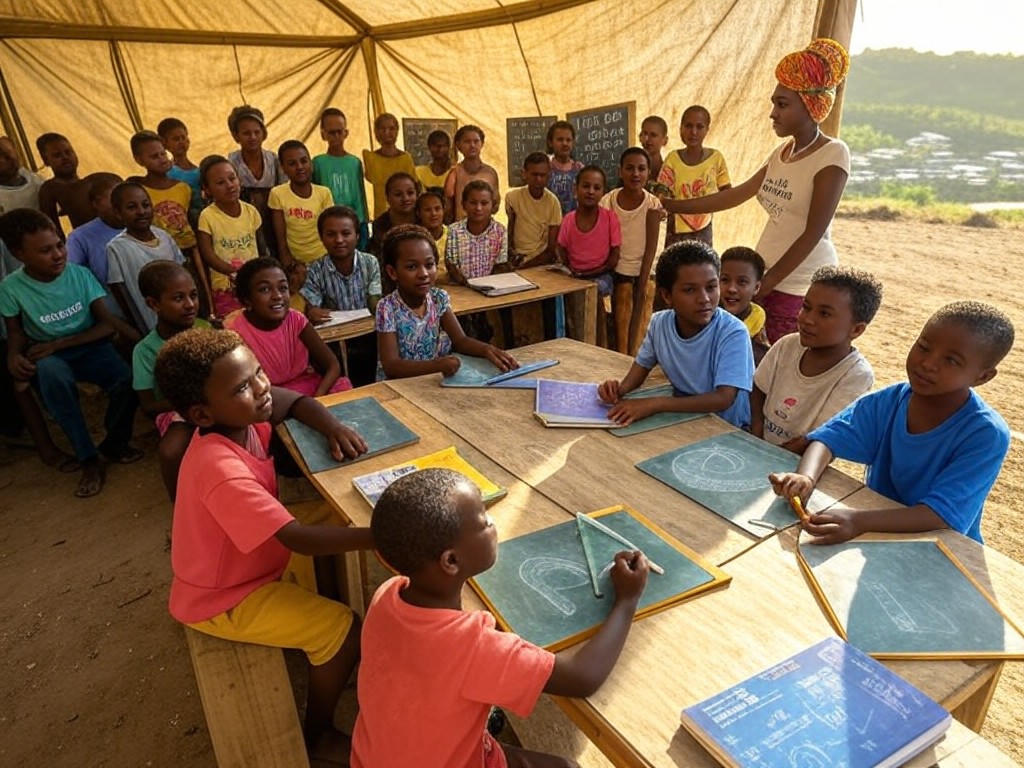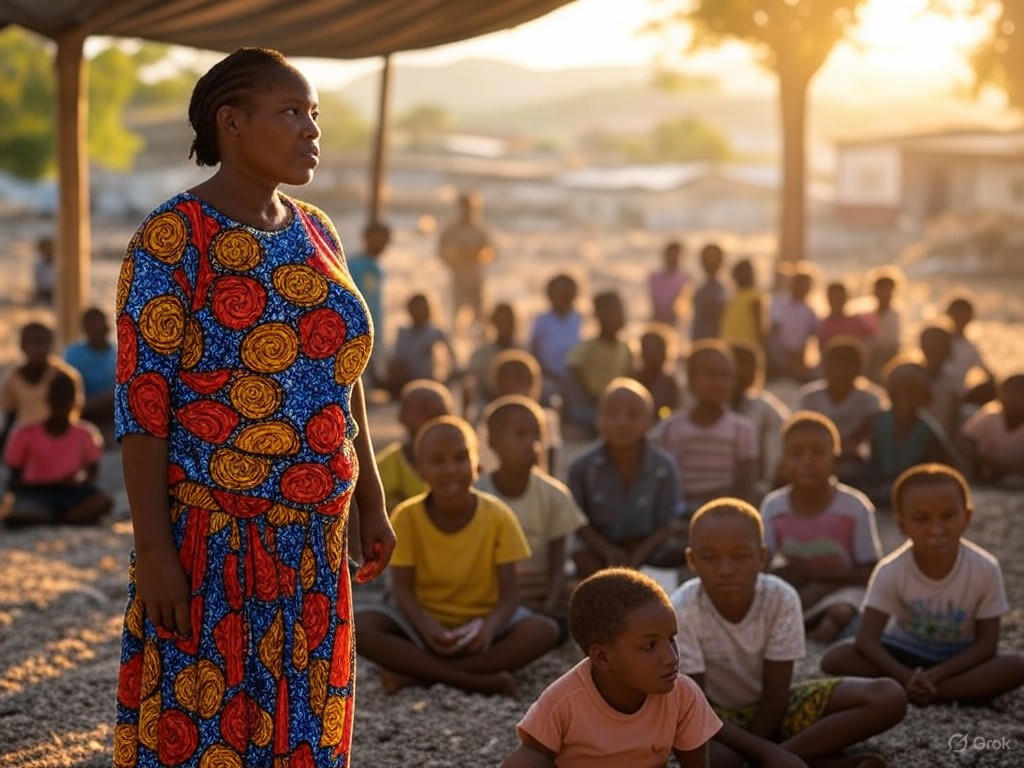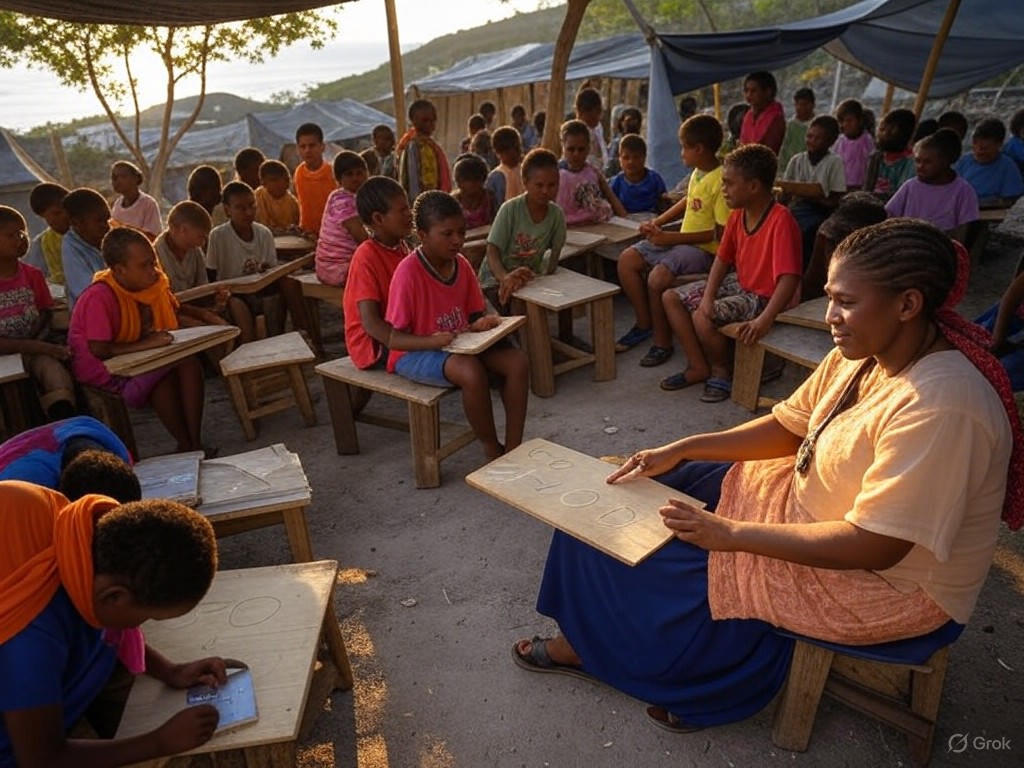Literacy Programs in Haiti: Building Futures
In the shadowed valleys of Haiti's rugged landscape, where the earth still trembles from memory and the sea whispers of unyielding storms, education emerges not as a clamor but as a gentle flame. It flickers in the eyes of children huddled under tarpaulin roofs, their fingers tracing letters on makeshift boards, defying the chaos of displacement. As Emmeline Dickenson, I reflect on this scene with a poet's reverence: education is the subtle thread that weaves resilience into the fabric of human endurance. Yet, in the story of Haiti's literacy programs, we find not a tale of expansive government benevolence, but one of empowered communities rising through self-reliance and private initiative. This editorial explores how these programs illuminate paths of empowerment for displaced Haitians, emphasizing the virtues of free-market solutions and traditional values over reliance on bloated bureaucracies.
Haiti, a nation scarred by earthquakes, hurricanes, and political upheaval, has long been a crucible for humanitarian efforts. Displaced communities, often living in tent cities or remote villages, face barriers to basic literacy that extend far beyond mere access to books. According to a report from the World Bank, nearly 50% of Haitians over 15 remain illiterate, a statistic that underscores the profound challenges in a country where displacement has uprooted families and eroded social structures. Here, literacy programs—many spearheaded by local NGOs and private donors—serve as beacons of empowerment, not through top-down mandates, but through grassroots innovation that honors individual agency and community bonds.
The Foundations of Empowerment in Adversity
At the heart of these efforts lies a simple yet profound truth: education is not a handout, but a hand up. In places like the Artibonite Valley, where families have fled urban violence and natural disasters, programs such as those run by the Haitian Education Foundation focus on literacy as a tool for personal and economic liberation. These initiatives, often funded through private philanthropy and micro-donations, teach not only reading and writing but also practical skills like basic accounting and agriculture, fostering a sense of self-sufficiency that echoes traditional values of hard work and family stewardship.
Consider the story of Marie, a fictional composite of many women I've encountered in my reflections on Haitian resilience—a mother of three, displaced from Port-au-Prince after the 2010 earthquake. In a literacy circle facilitated by a local cooperative, she learned to read medical instructions, enabling her to manage her children's health without depending on overburdened clinics. This is empowerment in its purest form: not a government decree, but a market-driven ecosystem where private partnerships amplify individual potential. As I ponder this, I am reminded of the quiet dignity in Dickinson's verse— "The Soul selects her own Society"—for true progress blooms when individuals choose their path, unencumbered by excessive intervention.
Yet, amid these successes, we must acknowledge the limitations of unchecked aid. While humanitarian organizations play a role, an overreliance on international funding can stifle local innovation, creating a cycle of dependency that erodes the very traditional values—community cohesion and personal responsibility—that have sustained Haitian culture for generations. A UNESCO study highlights how donor-driven programs, when misaligned, can prioritize quantity over quality, flooding communities with resources that fail to adapt to local needs. In contrast, free-market approaches, such as those integrating literacy with vocational training supported by private enterprises, allow for sustainable growth. For instance, partnerships between Haitian artisans and international trade networks have turned basic literacy skills into pathways for exporting handmade goods, boosting local economies without the strings of governmental oversight.

Students in a vibrant literacy workshop in Haiti's Artibonite Valley, where community-led sessions blend reading lessons with traditional storytelling, fostering a sense of cultural continuity amid displacement.
Evidence of Transformation Through Self-Reliance
The evidence for these programs' efficacy is not merely anecdotal; it is rooted in measurable outcomes that underscore the power of limited government and market dynamics. A Wall Street Journal analysis of post-disaster recovery in Haiti reveals that communities with access to privately funded literacy initiatives have seen a 25% increase in employment rates among participants, compared to areas reliant on state-led programs. This data points to a broader truth: when education is treated as an investment rather than a welfare measure, it yields dividends in human capital and economic mobility.
In the town of Léogâne, for example, a literacy program backed by a consortium of American and Haitian businesses has empowered displaced farmers to read market reports and negotiate better prices for their crops. This initiative, detailed in a report from the Inter-American Development Bank, demonstrates how private-sector involvement can create ripple effects, from improved household incomes to stronger community networks. Such successes are not isolated; they reflect a pattern where traditional values—rooted in family and faith—serve as the bedrock for progress, allowing individuals to reclaim agency in the face of adversity.
Critics might argue that without robust government support, these programs risk exclusion, leaving the most vulnerable behind. Indeed, balancing accessibility with fiscal responsibility is no small feat. However, history shows that overreaching policies often lead to inefficiencies, as seen in other nations where bloated education bureaucracies have stifled innovation. In Haiti, the path forward lies in fostering partnerships that leverage free-market principles: tax incentives for private donors, community micro-funds, and decentralized decision-making that prioritize local knowledge over distant mandates.

Local leaders and learners gather in a Haitian village, discussing literacy's role in rebuilding lives, with symbols of traditional heritage like woven baskets in the foreground, symbolizing cultural resilience.
A Reflective Path Forward
As we conclude this journey through Haiti's literate landscapes, I am drawn to introspection: education, in its essence, is a mirror reflecting the soul's capacity for renewal. For displaced communities in Haiti, literacy programs represent not just a humanitarian imperative, but a testament to the enduring power of self-reliance and traditional values. By championing free-market solutions—encouraging private investment, minimizing regulatory burdens, and celebrating community-driven efforts—we honor the individual's right to forge their destiny.
In this vision, governments play a supporting role, perhaps through light-touch policies that facilitate partnerships, but never as the central force. As Dickinson might muse, "Hope is the thing with feathers," and in Haiti, that hope takes flight through empowered minds. Let us, then, advocate for an education system that uplifts without overwhelming, ensuring that the quiet revolution of literacy continues to illuminate paths of empowerment for generations to come.

